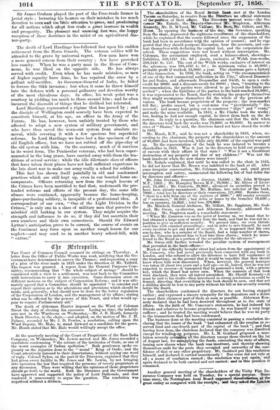The death of Lord Hardinge has followed fast upon his
sudden retirement from the Horse Guards. The veteran soldier will be attended to the grave by universal regret. Few men have wen a more general esteem from their country ; few have provoked less enmity. When he was a party man in the House of Com- mons, he was liked on the opposite side. He has always served with credit. Even when he has made mistakes, as men of higher capacity have done, he has repaired the error by a gallant self-sacrifice. As Governor-General of India, he failed to foresee the Sikh invasion ; but when it mite he threw himself into the defence with a personal gallantry and devotion worthy of the most chivalrous days. In office, his weak point was a courtesy in yielding too much to those around him ; and he often incurred the discredit of things that he disliked but tolerated.
Lord Hardinge represented a regime that has passed by ; and the disciple of Wellington could scarcely have been expected to constitute himself, at his age, an officer in the Army of the Future. He has, however, been unfairly treated by those who affected to adopt a new system of military government, and who have thus saved the worn-out system from absolute re- moval, while covering it with a few specious but superficial reforms. In Laid Hardinge we have lost a fine specimen of the old English officer, but we have not rubbed off the pipe-clay of the old system with him. On the contrary, much of it survives in its worst form. The Peninsular veterans, who had been super- annuated in the long peace, have carried away with them the tra- ditions of actual service ; while the idle dilettante class of officers that have taken their places have not had sufficient experience in the late short war to make our army really a school for soldiers.
This fact has shown itself painfully in old and condemned practices which are still kept up, even in our boasted home en- campments. Officers returning new from the rough lessons of the Crimea have been mortified to foul that, underneath the pre- tended reforms and efforts of the present day, the same idle abuses were continued, apparently because the home-keeping, plaoe-purchasing soldiery, is incapable of a professional idea. A correspondent of our own, " One of the Light Division in the Crimea," is only one in a class of military men that perceive the mischief still lurking in our system. They might acquire the strength and influence to do so, if they did but ascertain their own numbers and their own earnestness. Should Sir Edward Lytton's anticipation prove to be correct; the course of events on the Continent may force upon us another rough lesson for our neglect—and may send us in another heavy school-bill, with " extras."


























 Previous page
Previous page